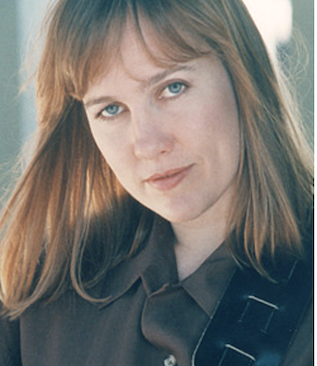January 5
Felix Manz (Died)

© Freedom From Religion Foundation. All rights reserved.On this date in 1527, Swiss heretic Felix Manz, born c. 1498, was drowned under sentence of the Zurich city council. As an Anabaptist, Manz was killed for opposing infant baptism in favor of baptism for adults, which the council made punishable by death.
—
Iris DeMent

On this date in 1961, singer-songwriter Iris Luella DeMent entered the world in Paragould, Ark., the last of eight children born to Flora Mae (Cupp) and Patric Shaw DeMent. She also had six step-siblings from her father’s first marriage (two other children with his wife Lola, who died at 33, didn’t survive infancy).
Patric DeMent farmed on a small river island inhabited mostly by extended family and worked at an Emerson Electric plant until losing his job after a failed strike. Described as a big man with a small paycheck, he moved the family to Buena Park, Calif., when DeMent was 3. Music and Pentecostal religion were a big part of her early life.
Her mother filled their home with music, playing the piano and singing gospel and traditional folk music. Her older sisters — Zelda, Reba, Regina and Faye — recorded a gospel album. In an essay she wrote for her second album “My Life” (1994), DeMent said her father was a fine fiddler but gave it up after he found religion.
She quit high school and moved to the Midwest, supporting herself by cleaning houses and waitressing. In her late 20s, after performing at open-mic nights and garnering a producer’s attention, she landed a recording contract that led to her debut album “Infamous Angel” in 1992, when her father died at 82. (Flora Mae lived until 2011.)
The album’s “doleful, hushed ‘Our Town’ would’ve sounded as if it were being broadcast from another planet. ‘People call me country,’ she told journalist Ben Thompson while on tour in Britain a couple years later. ‘But country doesn’t call me country.’ ” (Vinyl Me, Please, Dec. 16, 2021)
Some see its opening track “Let the Mystery Be” as a paean to freethought. Writer David Cantwell called it a “spritely agnostic anthem” (Ibid.) It opened the 1993 movie “Little Buddha” starring Keanu Reeves:
Everybody is a wonderin’ what and where they all came from
Everybody is a worryin’ ’bout where
They’re gonna go when the whole thing’s done
But no one knows for certain and so it’s all the same to me
I think I’ll just let the mystery be.
… Well, I believe in love and I live my life accordingly
But I choose to let the mystery be.
Years later, discussing the song with NPR interviewer Terry Gross, DeMent said the idea of eternal damnation in a fiery furnace bothered her. “And by the time I was 16, I didn’t believe that story, you know, that there was all this separation between me and all these other people in the world just because they didn’t claim Jesus Christ as their personal savior. I didn’t buy it. And I have to say, it wasn’t my choice to not buy it because it meant having to leave the church, and I loved going to church. I loved the music. I loved, you know, the community and the family. So it was actually a very sad day for me to have to own up to that in myself and know that if I was going to live with any personal integrity, I had to leave. So that’s what I did.” (“Fresh Air,” Oct. 21, 2015)
It also irked her that she wasn’t allowed to sing in the church choir bare-legged when she was 17: “The Bible never said anything about stockings.”
DeMent’s third album, “The Way I Should,” was released in 1996. It was nominated for a Grammy Award for Best Contemporary Folk Album, as was “My Life” two years earlier. She had married Elmer McCall, a firefighter and music tour manager, in 1991 before divorcing after eight years.
She stopped writing songs for several years but recorded and performed with John Prine and a few others. On Prine’s ribald “In Spite of Ourselves” (1999), her ethereal voice turns downright earthy. She married folk musician Greg Brown in 2002. They adopted a Russian girl, Daria “Dasha” Brown, in 2005 when she was 6, and eventually settled in Brown’s native Iowa, where Flora Mae DeMent also moved.
In 2004 she recorded “Lifeline” with 13 gospel songs and hymns, only one of which she wrote. “I sit around and play old church songs a lot,” she said at the time. “For me, it’s kind of like looking through a photo album. They take me back to the comforting aspects of my past. These songs are a spiritual thing for me, but not because they belong to a church or a book or anything. To me, they’re like this link I have to where I come from, and to my mom and dad, and to the people who came before them.” (No Depression, the Journal of Roots Music, Nov. 1, 2004)
Her lyrics and public statements sometimes raised hackles. “We got politicians runnin’ races on corporate cash / Now don’t tell me they don’t turn around and kiss them people’s ass” from the “Wasteland of the Free” track of “The Way I Should” touched off a boycott and stripping of state funding for a public radio station in Tampa, Fla.
In March 2003 the day after the U.S. invaded Iraq, she came onstage at the Barrymore Theater in Madison, Wis., to announce she couldn’t in good conscience perform out of respect for those suffering in an unjust war. Most of the audience was supportive, which wasn’t the case around the country. “And when I started getting the hate mail, it felt like the Pentecostal Church of God all over again to me.” (No Depression, ibid.)
She recorded her fifth album, “Sing The Delta,” in 2012, followed in 2015 by “The Trackless Woods.” The lyrics are poems by the late Russian writer Anna Akhmatova set to compositions by DeMent. She reunited with Prine in 2016 for his second duets album, “For Better, or Worse.”
“I started reflecting on my beliefs and seeing which ones held up next to my own experience. And when I was able to look at a belief and realize it wasn’t true for me anymore, I tossed it. And I had to leave the church because of that. I mean, I left the church in my heart and in my thinking; there was this period when I was there physically but I was not there. A year or two after that I quit going altogether. But even then, the songs still held up for me, they never let me down. I still loved those songs, and I still sang them.”
— Interview, No Depression, the Journal of Roots Music (Nov. 1, 2004)
